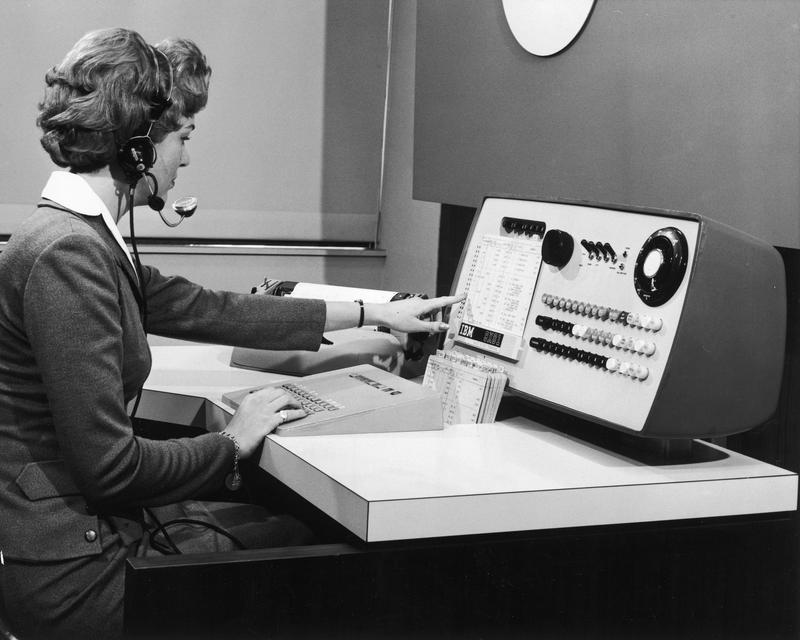Your Future in an Automated Society

Technology, information, and education; what the future looked like…in 1966. In this edition of Main Currents, host Lee Graham conducts a roundtable discussion with five representatives of the information technology field. They are Charles DeCarlo, IBM's Director of Automation Research, John Tebbel, a professor of journalism at NYU, Raymond Hagel, an education publisher at Crowell-Collier, Marlon McLaughlin representing the United States Commission of Education, and Quentin Carroll from the Public Relations Society of America.
The question that seems to be on everyone's mind when it comes to automation is, Which jobs will it replace? Professor Tebbel, asked about newspapers, assures listeners that, "Machines do not threaten the editorial side of newspapers. No machine can replace a reporter." IBM's DeCarlo broadens this to a more general statement that fear concerning the loss of jobs, "is very much overrated." Most of the replacement will take place in the field of "hand-eye motions." It's telling that all the references here are to "machines," not computers. As for education, a particular concern of the panel, they unanimously reject the idea that technology will replace the teacher. Hagel, the educational publisher, envisions a classroom where the teacher will have more, not less, one-on-one contact with her students, as machines will "free her time from relatively rote functions." DeCarlo makes a plea, eerily and depressingly relevant fifty years later, for increasing the number of teachers and reducing class sizes.
Once they have dismissed the notion that technology itself could have any deleterious effects, the panelists do go on to (accurately) foresee some of the ethical questions increased communication will pose. What were formerly questions only of interest to specialists will now be of interest to "the common man," as well. Some mostly good-natured twitting is directed at Carroll, the public relations representative (who, it is implied, has been imposed on the show by its sponsor) about press releases and other forms of "canned" news. Much is made of a perceived shift toward science and technology in the light of the Soviet launch of Sputnik and the ensuing Space Race. McLaughlin, the government education representative, assures the others that colleges have recognized this growing gap and are "making a real effort to combine science and the humanities." DeCarlo sees technology, with its sudden advances, as creating a need for increased adult education, as people retrain for new jobs. He also points out how deprived segments of society could benefit from technology, concluding that ultimately what we need "is more human contact, not more machines." Nowhere in this discussion does it occur to anyone that the sheer monetary savings offered by technology could have adverse and, in some cases, catastrophic impact on labor relations, the status of teachers, or on the social fabric in general.
Of more concern is the dawn of what we now call globalization. Graham refers to the recently launched Early Bird Satellite which, if it were joined by two more, could provide instant person-to-person contact. She mentions an outlandish prediction by Arthur C. Clarke that in the future people will all have mobile phones and be available at any time, a prospect she finds "dreadful." One of the panelists warns that while we are "a center of rationalized culture," enhanced communication with the "Oriental spiritual or mystical world" could prove unsettling for both sides. In general, though, optimism reigns. There has always been suspicion of new technology, it is pointed out. The feelings of the group are summed up by one member who proclaims, "I can't remember an age when the options are better."
Of the panelists, DeCarlo and Tebbel do most of the talking. Charles DeCarlo (1921-2004) later served as president of Sarah Lawrence College. He also wrote books on education and social change. John Tebell (1912-2004) worked in a variety of fields relating to journalism and publishing. In addition to a long career as a teacher, he wrote many books, the best-known being the four volume A History of Book Publishing in the United States.
The conversation itself, meandering and, at times, muddled though it may sound now, with its pauses, its considered asides, its deference to opposing points of view and actual acknowledgement of what the other person is saying, could, one might argue, serve as an example of the very qualities that have been lost or certainly shunted aside as technology, in media as everywhere else, has imposed its own brand of "efficiency" and consequent glibness on social discourse.
Audio courtesy of the NYC Municipal Archives WNYC Collection
WNYC archives id: 150017
Municipal archives id: T1827-1828
